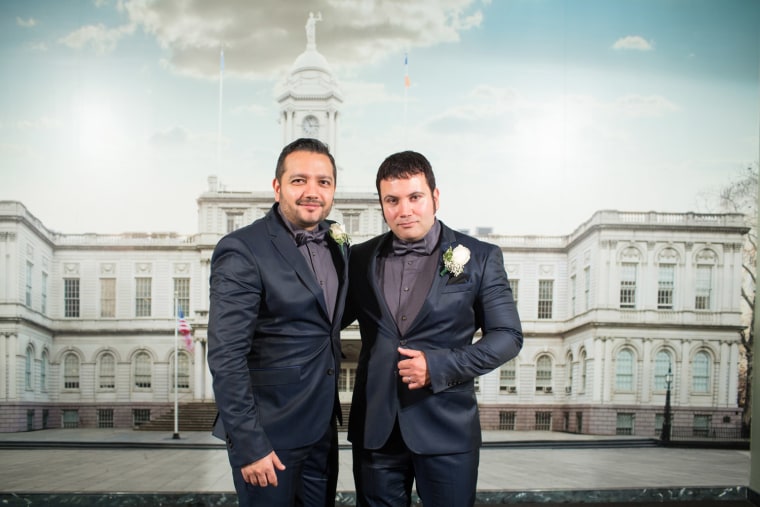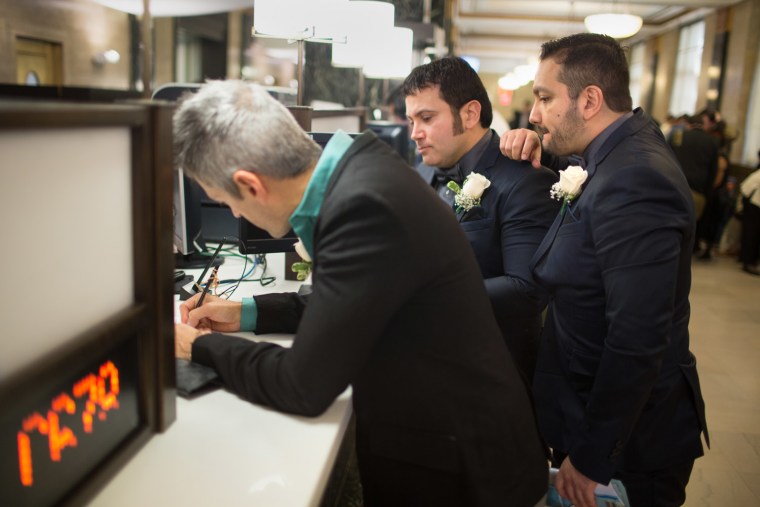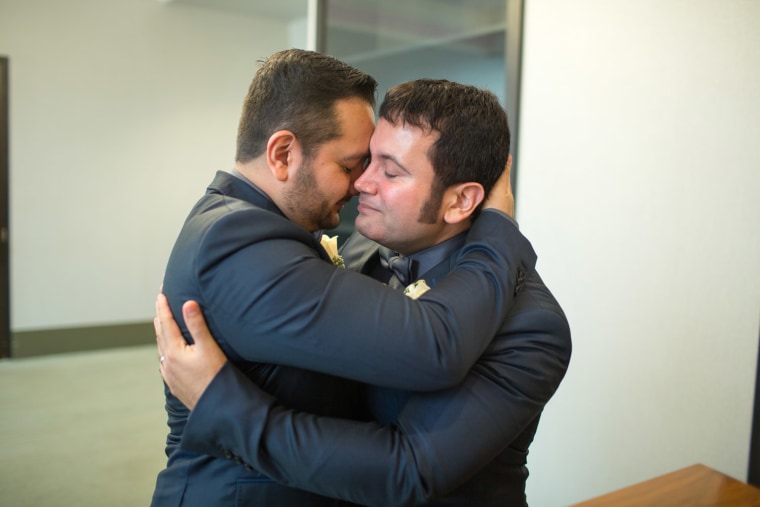NEW YORK – The two men held a long embrace after a Manhattan city clerk pronounced them married at a City Hall ceremony. They had traveled 2,000 miles to get here, one more leg of a years-long journey to having their relationship legally recognized in the United States.
Richard Hurtado, a Texas native, and Hugo Rendon, a Mexican national, were married last Tuesday after living abroad for years, unable to reside as spouses in the States. But that changed in June, when the U.S. Supreme Court struck down part of the Defense of Marriage Act, which had denied recognition of same-sex marriages and prevented gay Americans from sponsoring their foreign spouses for citizenship. Now bi-national couples like Hurtado and Rendon, who had faced the choice of moving abroad or risking deportation for the foreign spouse, are coming back to America.
“This is the start of a new beginning,” said Rendon, 43, who called his wedding to Hurtado, 40, a “blessing.”
For six years, Hurtado and Rendon, both certified public accountants, have lived in the violent Mexican border town of Nuevo Laredo, where the couple escaped an attempted robbery last November. But they couldn’t leave Nuevo Laredo, where Rendon has family and an established business. “I felt like it was a never-ending fight,” Rendon said in Spanish of waiting for U.S. law to change.
The DOMA decision was heralded by gay rightsadvocates as a first step toward legalizing same-sex marriage nationwide. A week after the ruling,the Department ofHomeland Security said immigration visa applications for same-sex spouses would be treated the same as those for opposite-sex spouses.
That was welcome news for bi-national gay couples in the U.S., a group estimated to number more than 32,000, according to Williams Institute, a think tank based at the UCLA School of Law. The federal government does not track data on such couples living overseas. But Immigration Equality, an advocacy group for gays and lesbians, said 900 of the 3,000 online inquiries it received after the DOMA ruling came from couples outside the U.S.

Under the new immigration guidelines, a valid marriage in a foreign country or a U.S. state where same-sex marriages are legal will be accepted, according to U.S. Citizenship and Immigration Services. Processing of family visas – a first step toward qualifying for a green card – is taking about 11 months, the agency said.
The DOMA Project said at least 15 binational, same-sex couples it works with, including two overseas, have received green cards following the court’s ruling. U.S. immigration officials have identified about 100 visa applications for foreign same-sex spouses of U.S. citizens that had been rejected because of DOMA but were being reviewed anew. Any other previously denied applicants can request to re-open their case, officials said.
Gay Americans who moved overseas to join foreign partners say they gave up a lot in the process: well-paid jobs, spending time with aging parents and other family, and leaving behind homes and communities.
“Part of the enormous cruelty of the Defense of Marriage Act has been that it forces you out of your country and away from social ties,” said Derek Tripp, project associate for The DOMA Project, an advocacy group for binational, same-sex couples.
For Darlene Nichols and her Belgian wife, Marie Le Fevere de Ten Hove, living abroad meant postponing their dreams.

Nichols, 55, moved to Belgium four years ago to join her wife, 37, but had a hard time finding work because of the language barrier. She also couldn’t get certifications in her field, home health care and massage therapy, forcing her to take lower-paying jobs such as cleaning buses.
Nichols missed her daughter and two young grandchildren, but visa requirements in Belgium hindered travels home. “It’s not been a vacation,” she said of her time abroad.
Soon after the couple learned about the DOMA ruling, they flew to California to be married (they previously had a civil union in Belgium). The pair now lives with Nichols’ daughter in Texas as they transition back to the U.S. “Every day I think about how it’s held us back,” Nichols said. “I just don’t feel like I’m living my life.”
Theresa Ewadinger, an American living in Japan with her Japanese wife and their infant son, couldn’t agree more. Ewadinger, 43, has been teaching English, one of the only jobs available to her in a country that promotes hiring citizens over foreigners. But the job offered no possibility of promotion, no bonus and no retirement plan.
“We’re outta here!” Ewadinger said of leaving Japan. “I just see our world opening up so much.” The family plans a return to her home state of Texas, where Ewandinger plans to apply to graduate school.
But challenges remain for these couples. There are immigration requirements, such as proving to the government that their relationship is legitimate, plus the daunting task of rebuilding their lives back in the U.S.
The couples may also have to contend with anti-gay marriage groups, who have objected to the government’s decision to allow them to immigrate.
John Eastman, board chairman for the National Organization of Marriage, said his group hasn’t discussed legal action on the issue yet but doesn’t rule it out. The majority opinion in the DOMA case was “tied to the fact that states have been the primary place where marriage policy is decided,” he said. “The federal government now seems bent on imposing it on them.”

Such concerns are far off for Rendon and Hurtado, who plan to move across the border to Laredo, Texas, where Hurtado grew up. He will work on mending his relationship with his parents, who couldn’t understand why he would leave his family and move to a place known for cartel violence.
“I wanted to be with him, so I had to do it this way,” said Hurtado.
As the nervous grooms awaited their big moment at the Manhattan marriage bureau last Tuesday, they talked about the home they’ve created together – Hurtado cooks, Rendon cleans – and showed off their Yorkshire Terrier, Valentino, whom they call their kid.
“We had a bit of everything,” highs and lows, Rendon said. But overall, “It’s been a beautiful journey.”
Related:
